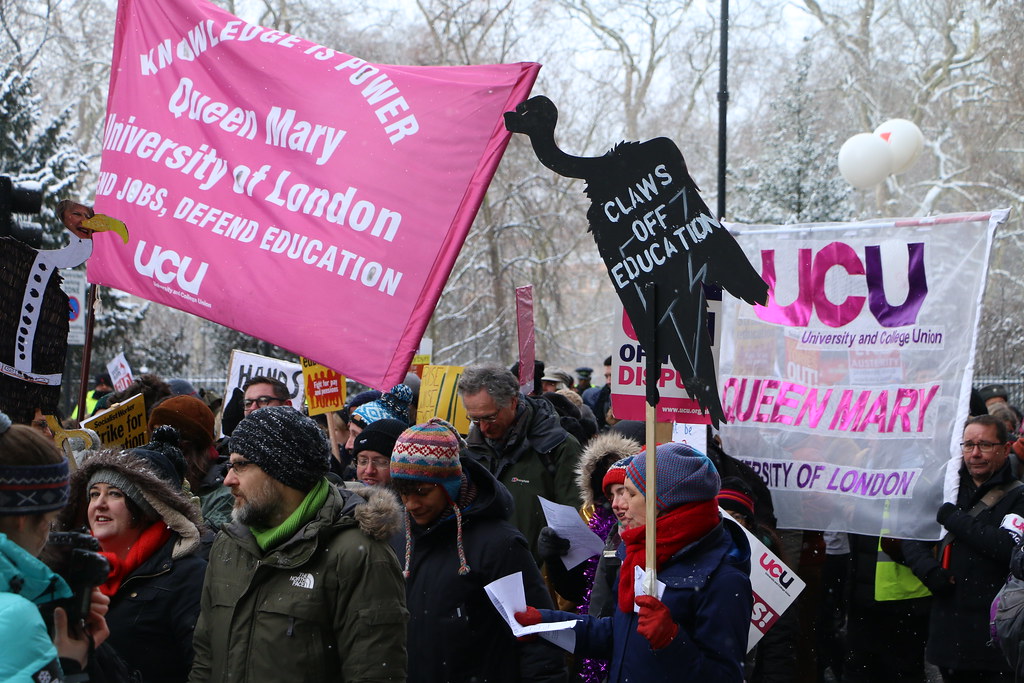Though industrial action is often assumed to be a sign of the strength of organised labour, this is not necessarily true. Sometimes strikes are simply a prosaic expression of desperation and powerlessness from workers, raging against the dying of the light.
This is the case with the University College Union’s recently announced industrial action as part of its ‘Four Fights’ dispute against the Universities and Colleges Employers Association (UCEA). The Four Fights in question are the demands that universities ‘address the scandal of the gender, ethnic, and disability pay gap, end contract casualisation and rising job insecurity, tackle the rising workloads driving our members to breaking point’ while also raising all salaries by £2,500.
That there is national action over each of these issues is a sign of the UCU’s weakness at a local level. Except for pay (which can be negotiated nationally), these are issues that would ideally be addressed on a branch-by-branch basis. The UCEA is technically an advisory body, and its power to compel its constituents’ bodies can be limited; therefore, the only one of the Four Fights that has a reasonable chance of being solved by negotiations with the UCEA is the £2,500 pay increase. Realistically, equality and security are not achieved by organisational diktat, but by the constant vigilance and action of organised labour in the workplace. Any piecemeal settlement achieved at national level will be built on sand.
Many of the UCU’s largest branches (for instance UCL and Manchester) did not reach the 50% threshold that branches need to legally partake in industrial action in either the Four Fights dispute or the concurrent pension dispute. In the 2018 dispute over pensions, more branches successfully cleared the balloting threshold. This change in turnout is a sign of fatigue amongst UCU members. Many members are exhausted by the pandemic and three years of stop-start industrial action. A union is ultimately only as effective as its members and activists.
While UCU’s short balloting window will have made it more difficult for some branches to get their vote out this still does not explain the low member turnout at institutions such as Ruskin. That the UCU felt it had to ballot so hastily is indicative of the gig-economy induced pressure (exacerbated by the pandemic) placed on its members, who then placed pressure on UCU’s leadership. The UCU has since run additional ballots to give some branches another chance to clear the threshold and contribute to an escalation of industrial action,which closed on Friday 14th of January 2022.
The failure of many branches to clear the threshold the first time around means that the impact of strikes was lessened, and their efficacy almost non-existent. The UCU cannot count on its branches to deliver and breach the legal balloting threshold; for a union looking to make industry-wide changes to employment conditions this is suboptimal.
If UCU had stronger local branches, then it could perhaps have trusted in the success of an aggregated ballot; alas this is not the case. In a damning indictment of the UCU’s local capability, multiple branch representatives claimed that the risk of failure in an aggregated ballot was too high.
If branches cannot rely on securing turnout in a ballot, then this does not bode well for their capability to represent its members at a local level. Unfortunately, the UCU has accomplished relatively little with its recent industrial action, such are the economic forces that constrain and reshape higher education. The only way to address the Four Fights is through well organised shop-floor activism and representation, but the UCU’s members appear to be tiring.
In 2018, UCU achieved a short-term victory (in an innately national dispute) by forcing Universities UK to abandon plans to scrap the defined benefit pensions in the Universities Superannuation Scheme pension plan and in the process attracted thousands of new members; this was an opportunity to nourish branch organisation. Since this victory, the situation has deteriorated and now, rather than striking from a place of strength, the UCU is organising from a much weaker base. It was the responsibility of UCU’s executive to cultivate its branches and now it is reaping what it failed to sow. Rather than being the birth pangs of a newly galvanised labour force, the ‘Four Fights’ appear to be the death rattle of higher education’s employment conditions.


